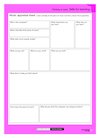Music: Thinking in Music
Add to My Folder
These simple strategies will help you teach children to listen to music, appraise what they hear and compose their own pieces
Music is a fun subject. It is relaxing, enjoyable and noisy – but it can also be a daunting subject to teach. This pack is designed for non-specialists and provides a simple introduction to developing music thinking. The activities are loosely linked to the QCA Scheme of Work and promote creativity and imagination, as well as covering the basic skills of composition, listening and responding to music, and creating music through concept mapping.
The ideas that follow can easily be incorporated into your planning, either as one-off activities or as a series of units. Each unit is easily adaptable for different year groups and can be used as an introduction to specific skills.
The activities and ideas follow a collaborative learning approach, whereby children share ideas with a partner or group and are encouraged to evaluate their own learning. This also forms a basis for teacher assessment and ensures that all children get to share everyone’s answers.
The sessions do not necessarily have to take place in a music room – they can easily be carried out in the classroom and some could be performed in the hall linked to a PE lesson.
Key skills
It is important to note that before children can do really complicated things, such as following a rhythmic pattern or attempting a loop of sound on a computer, they have to be confident with basic musical skills and terminology (see Activity sheet, ‘Music glossary’. It is essential that children understand the meanings of these words and use them when describing the pieces of music that they hear, and also when creating music themselves. One way to ensure the children have grasped the terms is to ask them to design a poster that shows one or more of the words and explains its meaning. You can display these posters during your subsequent music lessons as useful visual reminders.
Warm-up activities
Try the following activities to get you and your class ready and raring for music. The activities will develop children’s concentration and activate their minds, and are particularly useful after playtime or a PE lesson, when children may find it difficult to focus.
The game is called Copy Me. It’s very simple – you just give the class a series of instructions to follow:
- Do this – hold out your hands and touch your thumb with each finger.
- Say this – give the children a tongue twister such as ‘Betty bought badger’s bounty bar beautifully’.
- Clap this – clap various rhythms for the children to copy.
- Do this – fold your arms (or similar).
Making a music mind movie
Published 30 May 2008
Reviews
You need to be signed in to place a review.

